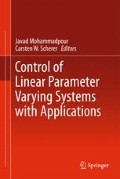Abstract
The chapter deals with the control of nonstationary linear parameter varying (NSLPV) systems, and is motivated by interest in the control of nonlinear systems along trajectories, particularly prespecified eventually periodic ones. The synthesis objective is to find a feedback parameter-dependent, time-varying controller, where the controller parameters are the same as those of the plant, such that the closed-loop system is asymptotically stable and the ℓ2-induced norm of the closed-loop input–output mapping is less than some ℓ2-gain performance levelγ. The analysis and synthesis results are given in terms of parameterized linear matrix inequalities (PLMIs), and some of the PLMI relaxation methods available in the literature, such as the sum of squares (SOS) decomposition method and the multiconvexity relaxation technique, are discussed. A fast and easy-to-implement algorithm for online controller construction is also provided.
Access this chapter
Tax calculation will be finalised at checkout
Purchases are for personal use only
References
Apkarian P, Gahinet P (1995) A convex characterization of gain-scheduled \({\mathcal{H}}_{\infty }\) controllers. IEEE Trans Automat Contr 40:853–864
Apkarian P, Tuan HD (2000) Parameterized LMIs in control theory. SIAM J Contr Optim 38(4):1241–1264
Bochnak J, Coste M, Roy MF (1998) Real algebraic geometry. Springer-Verlag, Berlin
Branicky MS (1995) Studies in hybrid systems: modeling, analysis, and control. PhD thesis, Massachusetts Institute of Technology
Chapellat H, Dahleh M (1992) Analysis of time-varying control strategies for optimal disturnace rejection and robustness. IEEE Trans Automat Contr 37:1734–1745
Dullerud GE, Lall SG (1999) A new approach to analysis and synthesis of time-varying systems. IEEE Trans Automat Contr 44(8):1486–1497
Farhood M (2010) Trajectory regulation of a double pendulum using a nonstationary LPV approach. In: Proceedings of the American Control Conference
Farhood M (2012) LPV control of nonstationary systems: a parameter-dependent Lyapunov approach. IEEE Trans Automat Contr 57(1):209–215
Farhood M, Dullerud GE (2002) LMI tools for eventually periodic systems. Syst Contr Lett 47(5):417–432
Farhood M, Dullerud GE (2005) Duality and eventually periodic systems. Int J Robust Nonlin Contr 15(13):575–599
Farhood M, Dullerud GE (2007) Model reduction of nonstationary LPV systems. IEEE Trans Automat Contr 52(2):181–196
Farhood M, Dullerud GE (2008) Control of nonstationary LPV systems. Automatica 44(8):2108–2119
Farhood M, Dullerud GE (2008) Control of systems with uncertain initial conditions. IEEE Trans Automat Contr 53(11):2646–2651
Farhood M, Feron E (2011) Obstacle-sensitive trajectory regulation via gain scheduling and semidefinite programming. IEEE Trans Contr Syst Technol, to appear, doi: 10.1109/TCST.2011.2159718, http://ieeexplore.ieee.org/stamp/stamp.jsp?tp=&arnumber=5960813&isnumber=4389040
Fradkov AL, Yakubovich VA (1979) The S-procedure and duality relations in nonconvex problems of quadratic programming. Vestnik Leningrad Univ Math 6:101–109. (In Russian 1973)
Gahinet P (1996) Explicit controller formulas for LMI-based H ∞ synthesis. Automatica 32(7):1007–1014
Green M, Limebeer D (1995) Linear robust control. Prentice Hall, Englewood Cliffs, NJ
Halanay A, Ionescu V (1994) Time-varying discrete linear systems. Birkhäuser, Boston, MA
Henrion D, Lasserre JB, Loefberg J (2009) GloptiPoly 3: moments, optimization and semidefinite programming. Optim Meth Software 24:761–779
Lasserre J (2008) A semidefinite programming approach to the generalized problem of moments. Math Program 112:65–92
Laurent M (2009) Sums of squares, moment matrices and optimization over polynomials. In: Putinar M, Sullivant S (eds) Emerging applications of algebraic geometry. IMA volumes in mathematics and its applications, vol 149. Springer, pp 157–270
Lavaei J, Aghdam AG (2008) Robust stability of LTI systems over semialgebraic sets using sum-of-squares matrix polynomials. IEEE Trans Automat Contr 53(1):417–423
Liberzon D (2003) Switching in systems and control. Birkhäuser, Boston, MA
Lofberg J (2004) YALMIP: a toolbox for modeling and optimization in MATLAB. In: Proceedings of the CACSD Conference. Taipei, Taiwan. http://control.ee.ethz.ch/~joloef/wiki/ pmwiki.php
Lofberg J, Parrilo PA (2004) From coefficients to samples: a new approach to SOS optimization. In: Proceedings of IEEE conference on decision and control, pp 3154–3159
Lu B, Wu F (2004) Switching LPV control designs using multiple parameter-dependent Lyapunov functions. Automatica 40(11):1973–1980
Packard A (1994) Gain scheduling via linear fractional transformations. Syst Contr Lett 22:79–92
Parrilo PA (2000) Structured semidefinite programs and semialgebraic geometry methods in robustness and optimization. PhD thesis, California Institute of Technology. http://www.cds.caltech.edu/pablo/
Parrilo PA (2003) Semidefinite programming relaxations for semialgebraic problems. Math Program Ser B 96(2):293–320
Parrilo PA (2005) Exploiting algebraic structure in sum of squares programs. In: Henrion D, Garulli A (eds) Positive polynomials in control. Lecture notes in control and information sciences, vol. 312, Springer, Berlin/Heidelberg, pp 181–194
Prajna S, Papachristodoulou A, Seiler P, Parrilo PA (2004) SOSTOOLS: sum of squares optimization toolbox for MATLAB. Optim Meth Software. http://www.cds.caltech.edu/sostools and http://www.mit.edu/~parrilo/sostools
Rugh WJ, Shamma JS (2000) Research on gain scheduling. Automatica 36(10):1401–1425
Scherer CW (2006) LMI relaxations in robust control. Euro J Contr 12(1)
Scherer CW, Hol CWJ (2006) Matrix sum-of-squares relaxations for robust semi-definite programs. Math Program 107:189–211
Stengle G (1973) A nullstellensatz and a positivstellensatz in semialgebraic geometry. Math Annal 207:87–97
Sturm JF (1999) Using SeDuMi 1.02, a MATLAB toolbox for optimization over symmetric cones. Optim Meth Software 11–12:625–653. Version 1.05. http://fewcal.kub.nl/sturm
Toh KC, Todd MJ, Tutuncu RH (1999) SDPT3—a Matlab software package for semidefinite programming. Optim Meth Software 11:545–581
Tuan HD, Apkarian P (1999) Relaxations of parameterized LMIs with control applications. Int J Robust Nonlin Contr 9:59–84
Tuan HD, Apkarian P (2002) Monotonic relaxations for robust control: new characterizations. IEEE Trans Automat Contr 47(2):378–384
Wu F, Dong K (2006) Gain-scheduling control of LFT systems using parameter-dependent Lyapunov functions. Automatica 42:39–50
Wu F, Prajna S (2005) SOS-based solution approach to polynomial LPV system analysis and synthesis problems. Int J Contr 78(8):600–611
Yakubovich VA (1977) The S-procedure in nonlinear control theory. Vestnik Leningrad Univ Math 4. (In Russian 1971)
Author information
Authors and Affiliations
Corresponding author
Editor information
Editors and Affiliations
Rights and permissions
Copyright information
© 2012 Springer Science+Business Media, LLC
About this chapter
Cite this chapter
Farhood, M. (2012). A Parameter-Dependent Lyapunov Approach for the Control of Nonstationary LPV Systems. In: Mohammadpour, J., Scherer, C. (eds) Control of Linear Parameter Varying Systems with Applications. Springer, Boston, MA. https://doi.org/10.1007/978-1-4614-1833-7_5
Download citation
DOI: https://doi.org/10.1007/978-1-4614-1833-7_5
Published:
Publisher Name: Springer, Boston, MA
Print ISBN: 978-1-4614-1832-0
Online ISBN: 978-1-4614-1833-7
eBook Packages: EngineeringEngineering (R0)

